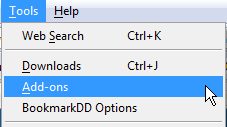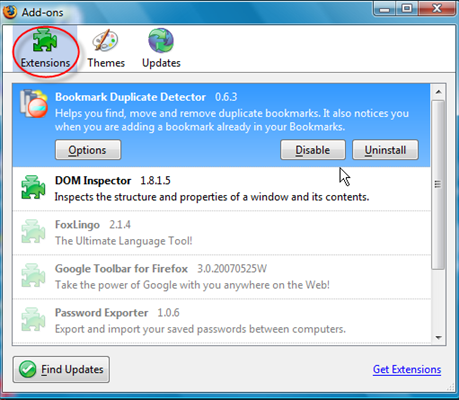One of the biggest complaints with using Firefox in Windows is the amount of memory it uses after long periods of being open. There are many reasons for this such as the number of Plugins, Themes and System Extensions running, not clearing the download history, memory leaks in older versions of Firefox, etc…
Probably the biggest culprit is the number of extension add-ons that are loaded when Firefox is started. Yes, were all guilty of having a ton of add-ons, but who can blame us when there are so many great extensions. While having to many add-ons can cause Firefox to consume memory, most of them do not always need to be enabled and should be disabled.
Start by identifying which add-ons are installed and enabled by clicking on Tools \ Add-ons from the menu.

Once the Add-ons window opens, it will default to the Extension view and list all installed add-ons.

You should look for extensions that do not need to be enabled all the time. In the example above, I can disable Password Exporter. This add-on is used very little and does not need to be running when browsing the Internet.
To disable, highlight the extension and click the Disable button. The message "This add-on will be disabled when Fiefox is restarted" will be displayed.

After disabling the add-ons that you do not want loaded when Firefox starts, close the Add-ons window and restart Firefox by closing and launching Firefox. You can verify the extensions are disabled by opening the Add-ons window and making sure the Enable button is present next to the extension you disabled previously.

The best extensions to disable are the ones similar to Password Exporter, which are only used when needed. Just enable the extension and restart Firefox. You do not need to uninstall the extension to get the benefit of having Firefox not consume more memory than it needs.
Probably the biggest culprit is the number of extension add-ons that are loaded when Firefox is started. Yes, were all guilty of having a ton of add-ons, but who can blame us when there are so many great extensions. While having to many add-ons can cause Firefox to consume memory, most of them do not always need to be enabled and should be disabled.
Start by identifying which add-ons are installed and enabled by clicking on Tools \ Add-ons from the menu.

Once the Add-ons window opens, it will default to the Extension view and list all installed add-ons.

You should look for extensions that do not need to be enabled all the time. In the example above, I can disable Password Exporter. This add-on is used very little and does not need to be running when browsing the Internet.
To disable, highlight the extension and click the Disable button. The message "This add-on will be disabled when Fiefox is restarted" will be displayed.

After disabling the add-ons that you do not want loaded when Firefox starts, close the Add-ons window and restart Firefox by closing and launching Firefox. You can verify the extensions are disabled by opening the Add-ons window and making sure the Enable button is present next to the extension you disabled previously.

The best extensions to disable are the ones similar to Password Exporter, which are only used when needed. Just enable the extension and restart Firefox. You do not need to uninstall the extension to get the benefit of having Firefox not consume more memory than it needs.
No comments:
Post a Comment